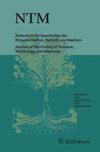来源期刊
NTM
HISTORY & PHILOSOPHY OF SCIENCE-
期刊介绍:
NTM ist die größte Zeitschrift für Wissenschafts-, Technik- und Medizingeschichte im deutschen Sprachraum. Sie bietet ein internationales Forum für Forschungsbeiträge, Debatten und Rezensionen aus dem Gesamtgebiet der Wissenschafts-, Technik- und Medizingeschichte in allen Epochen und unterschiedlichen Regionen. Wir veröffentlichen innovative Beiträge, die an neuere theoretische und methodische Ansätze und Debatten anknüpfen, neues empirisches Material erschließen oder neue Forschungsfelder eröffnen. Neben der Geschichte der Naturwissenschaften, der Technik und der Medizin sind auch Beiträge zur Geschichte der Geistes-, Sozial- und Kulturwissenschaften willkommen.
NTM erscheint vierteljährlich. Neben dem klassischen, individuellen Forschungsartikel und Buchrezensionen publiziert NTM als weitere Textgattungen das „Forum“, das „Fundstück“ sowie “Essay Reviews”:
- Provokative oder auch kontroverse Beiträge stoßen im Forum Debatten und Fragen an, die unser Feld kommend prägen werden.
- Das Fundstück erschließt vergessene Objekt-, Bild- oder Schriftquellen von hoher historischer Relevanz.
- Essay Reviews bieten entlang von Literaturbesprechungen einen kritischen Überblick über ein entstehendes Forschungsfeld.
- Außerdem erscheinen Themenhefte (4-6 Artikel) sowie Special Sections (3-4 Artikel), die ein neues Forschungsfeld abstecken bzw. dessen Potential exemplarisch aufzeigen.
NTM wird seit 2018 von der Gesellschaft für die Geschichte der Wissenschaften, der Medizin, und der Technik (GWMT) herausgegeben (www.gwmt.de). Zuvor war NTM das wissenschaftliche Organ der DGGMNT (Deutsche Gesellschaft für Geschichte der Medizin, Naturwissenschaft en und Technik e. V.). Die Zeitschrift hat eine lange Tradition und wurde 1960 von Gerhard Harig und Alexander Mette in Leipzig gegründet.
• Doppelt anonymes Begutachtungsverfahren
• Mischung aus unterschiedlichen Textgattungen (Artikel, Fundstück, Forum, Essay Reviews, Rezensionen)
• Publikationssprachen: Deutsch, Englisch und Französisch
• Volltext-Zugriff fu¨r alle Institutionen des DEAL Konsortiums ab 2020. Weitere Informationen zu DEAL unter
https://www.springernature.com/gp/open-research/institutional-agreements/oaforgermany-de
NTM is the largest and most comprehensive journal for history of science, technology, and medicine in the German-speaking world. It offers an international forum for research articles, debates and reviews in the entire field of history of science, technology, and medicine in all epochs and various regions. The journal focuses on innovative theoretical and methodological approaches and discussions which make new empirical material or areas of research accessible. Contributions to the history of science, technology, and medicine, but also to the history of the social sciences and the humanities are welcome.
NTM appears four times a year. Aside from classic individual research articles and book reviews, NTM publishes as additional text genres the “Forum”, the “Lost & Found”, and also “Essay Reviews”:
- In the Forum, provocative or controversial contributions encourage debates and questions, that are set to shape the future of our field.
- Lost & Found aims at exploring forgotten objects and other sources of great historical relevance.
- Essay Reviews provide a critical overview of emerging research fields along literature reviews.
- Moreover, NTM publishes Special Issues (4 – 6 articles) as well as Special Sections (3-4 articles), are aiming at defining new research fields or demonstrating their potential.
NTM has been published under the auspices of the „Gesellschaft für die Geschichte der Wissenschaften, der Medizin, und der Technik (GWMT)”, (www.gwmt.de) since 2008. Before, NTM used to be the scientific body of the DGGMNT (Deutsche Gesellschaft für Geschichte der Medizin, Naturwissenschaft en und Technik e. V.). The journal has a long tradition and was founded in 1960 by Gerhard Harig and Alexander Mette in Leipzig.
• Double-blind peer review process
• Mixture of different text genres (articles, lost & found, forum, essay reviews, reviews)
• Papers are accepted for publication in German, English, and French
• Open access to the full-text version under country-specific conditions
Bibliographie
N.T.M.
Zuerst erschienen 1960 / first published in 1960
Namensänderung ab 1.1.2008 / renamed in 2008
1 Volumen pro Jahr, 4 Hefte pro Volumen / 1 vol. per year, 4 issues per volume
ca. 500 Seiten pro Volumen / 500 pages per volume
Format: 15.5 x 23.5 cm
ISSN 0036-6978 (print)
ISSN 1420-9144 (electronic)
期刊最新文献
Psychische Gesundheit und Geschlecht in der zweiten Hälfte des 20. Jahrhunderts. Einleitung : Verflochtene Geschichte von psychischer Gesundheit und Geschlecht: Forschungsstand und offene Fragen.
[The Best Alcohol Prevention Is Anti-Emancipation : The Debate On Gender-Specific Alcohol Consumption and the Increasing Dependence of Women, 1950-1990].
["To go mad". The Generation of Feminist Criticism of Psychiatry: The Example of the Magazine Courage, 1978-1980].
[Bad-Mad-Female. Scientific Analyses of Female Violent Crime from the 1960s to the 1990s].
[Psychological Women's Liberation: Feminist Therapy Between Psychology and the Women's Movement in the Federal Republic of Germany in the 1970s].


